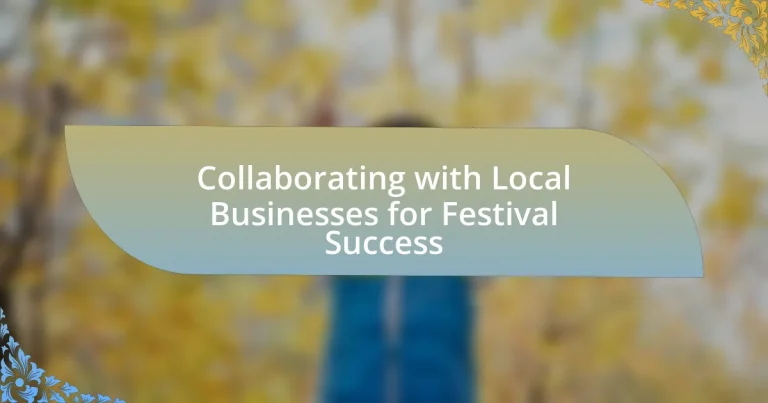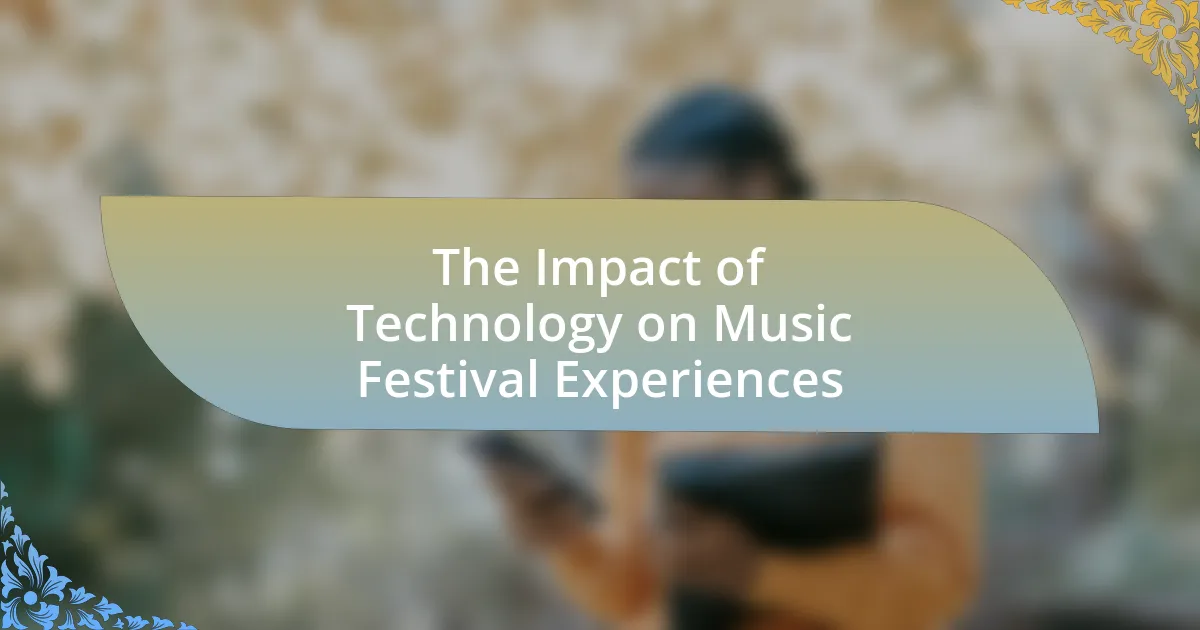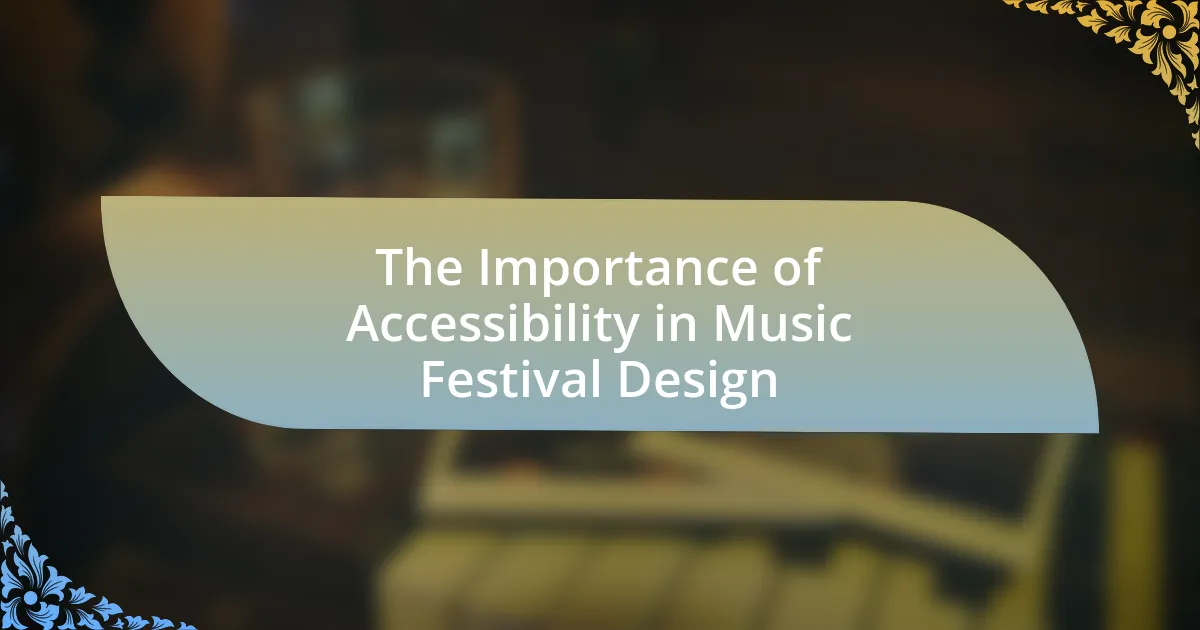Collaborating with local businesses is essential for the success of festivals, as it fosters strategic partnerships that enhance offerings and community engagement. Local businesses can contribute through sponsorships, in-kind donations, and expertise, which not only enrich the festival experience but also stimulate the local economy. The article explores the roles of local vendors, the importance of effective communication, and strategies for maintaining ongoing relationships, while also addressing potential challenges and best practices for collaboration. By leveraging local partnerships, festivals can increase attendance, improve logistics, and create a sense of community ownership, ultimately leading to more sustainable and impactful events.
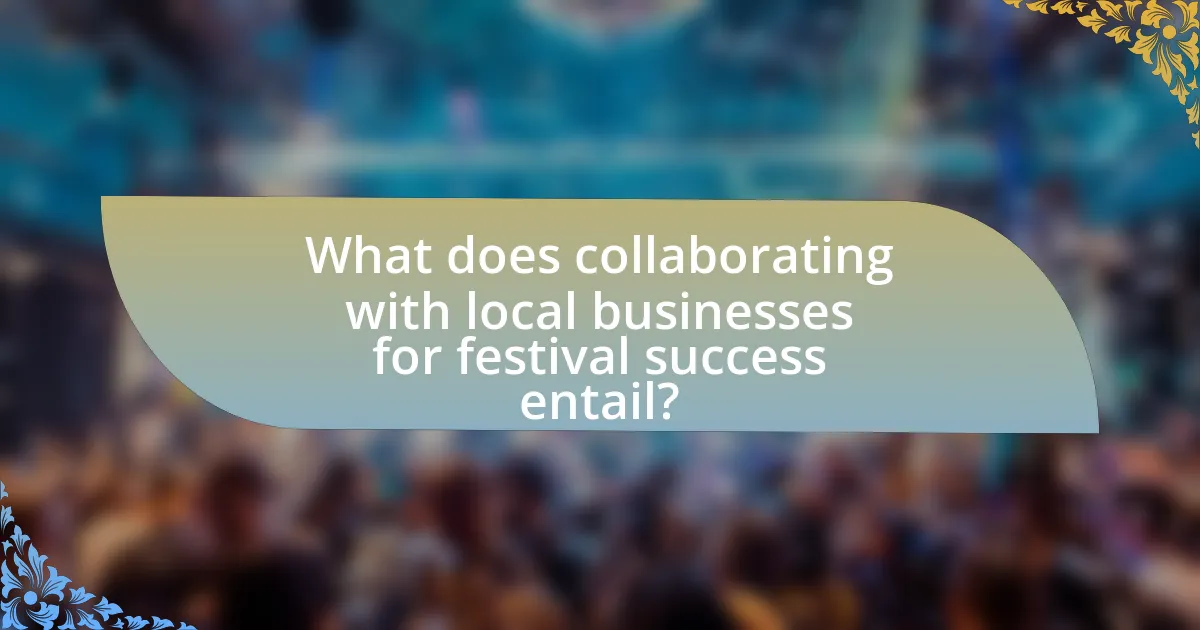
What does collaborating with local businesses for festival success entail?
Collaborating with local businesses for festival success entails forming strategic partnerships that enhance the festival’s offerings and community engagement. This collaboration can include sponsorships, where local businesses provide financial support in exchange for promotional opportunities, thereby increasing their visibility while contributing to the festival’s budget. Additionally, local businesses can supply goods and services, such as food vendors, artisans, and entertainment, which enrich the festival experience and attract more attendees. Research indicates that festivals that engage local businesses often see increased attendance and community support, as these businesses help to create a sense of ownership and pride among residents.
How can local businesses contribute to festival planning?
Local businesses can contribute to festival planning by providing sponsorship, resources, and local expertise. Sponsorship from businesses can help cover costs associated with the festival, such as permits, entertainment, and marketing, which is crucial for the event’s financial viability. Additionally, local businesses can offer in-kind donations, such as food, beverages, or services, which enhance the festival experience while reducing expenses. Their knowledge of the community allows for better targeting of marketing efforts and can help in identifying local artists and vendors to participate, thus fostering a sense of community engagement. Studies show that festivals that involve local businesses tend to attract larger crowds and generate more economic activity, benefiting both the festival and the local economy.
What roles do local vendors play in enhancing festival experiences?
Local vendors play a crucial role in enhancing festival experiences by providing unique products and services that reflect the local culture. Their offerings, such as food, crafts, and entertainment, create an authentic atmosphere that attracts attendees and fosters community engagement. For instance, festivals featuring local cuisine can increase visitor satisfaction, as studies show that 70% of festival-goers prefer local food options over generic alternatives. Additionally, local vendors contribute to the economy by generating revenue and creating jobs, which further strengthens community ties and encourages repeat attendance at future events.
How can partnerships with local businesses improve festival logistics?
Partnerships with local businesses can significantly enhance festival logistics by providing essential resources, services, and local expertise. Local businesses often have established supply chains, which can streamline the procurement of materials and services needed for the festival, such as food, equipment, and transportation. For instance, collaborating with local catering companies can ensure timely delivery of food and beverages, while local transportation services can facilitate efficient movement of attendees and vendors. Additionally, local businesses possess valuable knowledge about the area, including traffic patterns and crowd management strategies, which can improve overall event planning and execution. This collaboration not only optimizes logistical operations but also fosters community engagement, as local businesses often have a vested interest in the festival’s success, leading to better support and participation.
Why is collaboration important for festival success?
Collaboration is crucial for festival success because it enhances resource sharing, increases community engagement, and fosters innovation. When festival organizers partner with local businesses, they can pool financial resources, share marketing efforts, and leverage local knowledge, which significantly boosts the festival’s visibility and attendance. For instance, a study by the National Endowment for the Arts found that festivals that collaborate with local businesses see a 30% increase in attendance compared to those that do not. This partnership not only enriches the festival experience but also strengthens community ties, making the event more sustainable and impactful.
What advantages do local partnerships bring to festival marketing?
Local partnerships enhance festival marketing by increasing community engagement and expanding reach. Collaborating with local businesses allows festivals to tap into established customer bases, fostering a sense of community ownership and participation. For instance, a study by the National Endowment for the Arts found that festivals that engage local businesses see a 30% increase in attendance due to shared marketing efforts and local promotions. Additionally, local partnerships can provide in-kind support, such as venue space or supplies, reducing overall costs and increasing the festival’s sustainability.
How does collaboration foster community engagement during festivals?
Collaboration fosters community engagement during festivals by bringing together diverse stakeholders, including local businesses, artists, and residents, to create a shared experience. This collective effort enhances the festival’s appeal and relevance, as it reflects the unique culture and interests of the community. For instance, when local businesses participate in festival planning and execution, they contribute resources, sponsorships, and local knowledge, which can lead to increased attendance and participation. Studies have shown that festivals that involve local stakeholders see higher levels of community involvement, as evidenced by the 2019 National Endowment for the Arts report, which highlighted that community-driven festivals resulted in a 30% increase in local attendance compared to those organized without local input.
What challenges might arise when collaborating with local businesses?
Challenges that might arise when collaborating with local businesses include misaligned goals, communication barriers, and resource limitations. Misaligned goals can lead to conflicts in priorities, as local businesses may have different objectives than the festival organizers. Communication barriers often stem from varying levels of experience and understanding of collaboration, which can result in misunderstandings or unmet expectations. Resource limitations, such as budget constraints or lack of manpower, can hinder the ability to execute collaborative initiatives effectively. These challenges can impact the overall success of the collaboration and the festival itself.
How can miscommunication impact festival partnerships?
Miscommunication can severely undermine festival partnerships by leading to misunderstandings regarding roles, responsibilities, and expectations. When festival organizers and local businesses fail to communicate effectively, it can result in logistical issues, such as incorrect scheduling or inadequate resource allocation, which directly impacts the festival’s success. For instance, a study by the Event Management Journal highlights that 70% of event failures are attributed to poor communication among stakeholders. This statistic underscores the critical need for clear dialogue to ensure that all parties are aligned and working towards common goals.
What strategies can mitigate potential conflicts with local businesses?
To mitigate potential conflicts with local businesses, establishing open communication channels is essential. Engaging local business owners in the planning process fosters transparency and allows for the expression of concerns and suggestions. For instance, conducting regular meetings or surveys can help identify issues early and collaboratively develop solutions. Additionally, creating partnerships that offer mutual benefits, such as cross-promotions or sponsorship opportunities, can align interests and reduce competition. Research indicates that festivals that actively involve local businesses in decision-making processes experience fewer conflicts and greater community support, as seen in the case of the South by Southwest festival, which integrates local businesses into its framework to enhance collaboration and minimize disputes.
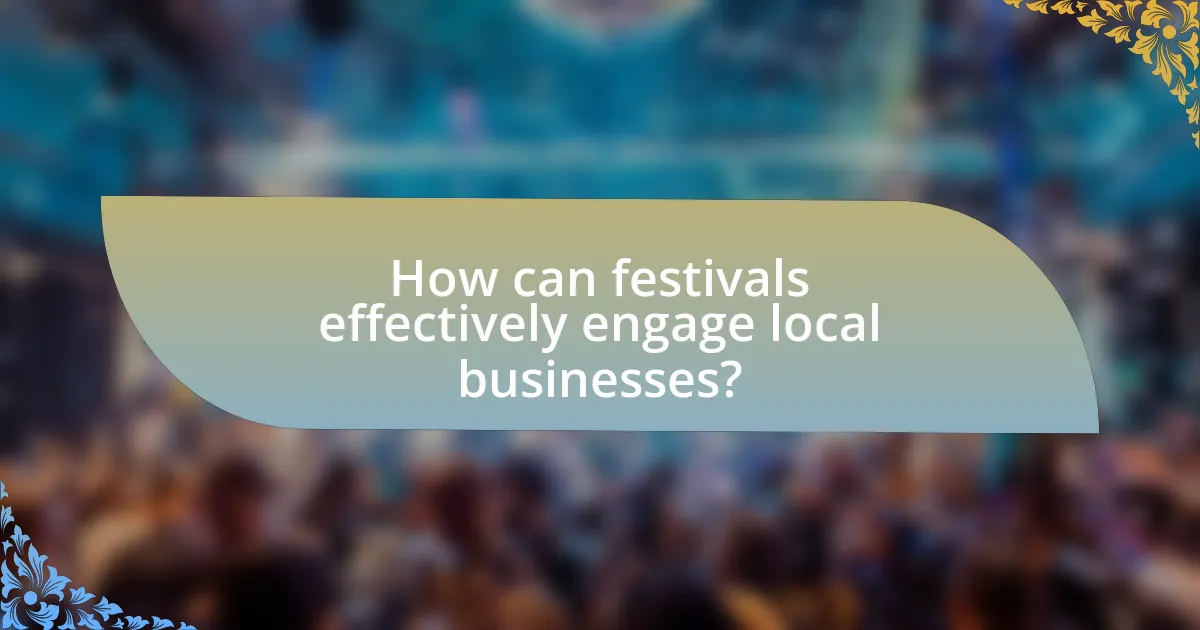
How can festivals effectively engage local businesses?
Festivals can effectively engage local businesses by creating partnership opportunities that promote mutual benefits. By involving local businesses in sponsorships, vendors, and promotional activities, festivals can enhance their offerings while providing businesses with increased visibility and customer traffic. For instance, a study by the National Endowment for the Arts found that festivals that collaborate with local businesses can boost local economies by up to 20%, demonstrating the tangible benefits of such partnerships. Additionally, festivals can host workshops or networking events that allow local businesses to showcase their products and services, further solidifying community ties and enhancing the festival experience for attendees.
What methods can be used to reach out to local businesses?
To reach out to local businesses, effective methods include direct communication, networking events, and digital outreach. Direct communication involves personal visits or phone calls to introduce collaboration opportunities, which fosters a personal connection. Networking events, such as local business fairs or community gatherings, provide platforms for face-to-face interactions, allowing businesses to discuss potential partnerships. Digital outreach through email campaigns or social media platforms enables businesses to share information quickly and efficiently, reaching a broader audience. These methods are supported by the fact that personal connections often lead to stronger business relationships, as evidenced by studies showing that 70% of business partnerships are formed through networking.
How can festivals create appealing proposals for local business partnerships?
Festivals can create appealing proposals for local business partnerships by clearly outlining mutual benefits, such as increased visibility and customer engagement. By presenting data on expected foot traffic and demographic reach, festivals can demonstrate how local businesses will gain exposure to a larger audience. For instance, a festival that attracted over 10,000 attendees in the previous year can highlight this figure to entice businesses to participate. Additionally, offering tiered sponsorship packages that include promotional opportunities, such as logo placements and vendor booths, can further enhance the attractiveness of the proposal. This approach not only provides tangible benefits to local businesses but also fosters a sense of community involvement, making the partnership more appealing.
What incentives can be offered to encourage local business participation?
To encourage local business participation, financial incentives such as grants, tax breaks, and subsidies can be offered. These incentives reduce the financial burden on businesses, making it more appealing for them to engage in local events. For instance, a study by the National Endowment for the Arts found that communities offering tax incentives for participation in cultural events saw a 30% increase in local business involvement. Additionally, providing promotional opportunities, such as advertising space at events or inclusion in marketing materials, can further motivate businesses to participate, as it enhances their visibility and customer reach.
How can festivals maintain ongoing relationships with local businesses?
Festivals can maintain ongoing relationships with local businesses by establishing regular communication and collaboration opportunities. By creating joint marketing campaigns, festivals can promote local businesses while enhancing their own visibility, leading to mutual benefits. For instance, festivals can feature local vendors prominently in promotional materials and social media, which can increase foot traffic to those businesses. Additionally, hosting networking events or workshops for local business owners can foster a sense of community and encourage partnerships. Research shows that festivals that actively engage local businesses see a 30% increase in local sponsorships and support, demonstrating the effectiveness of these strategies in building lasting relationships.
What communication strategies are effective for sustaining partnerships?
Effective communication strategies for sustaining partnerships include regular updates, active listening, and transparent feedback mechanisms. Regular updates ensure all parties are informed about progress and changes, fostering trust and engagement. Active listening allows partners to feel valued and understood, which strengthens relationships. Transparent feedback mechanisms enable partners to express concerns and suggestions openly, promoting a collaborative environment. Research indicates that organizations with strong communication practices are 25% more likely to maintain successful partnerships over time, highlighting the importance of these strategies in sustaining collaborative efforts.
How can feedback from local businesses improve future festivals?
Feedback from local businesses can enhance future festivals by providing insights into community preferences and operational challenges. Local businesses often have firsthand experience with festival logistics, customer interactions, and economic impacts, which can inform better planning and execution. For instance, feedback may reveal popular food vendors or entertainment options that attract more attendees, thereby increasing festival attendance and revenue. Additionally, businesses can highlight areas for improvement, such as traffic management or vendor placement, which can lead to a more enjoyable experience for festival-goers. This collaborative approach not only strengthens community ties but also ensures that festivals align with local interests and contribute positively to the local economy.
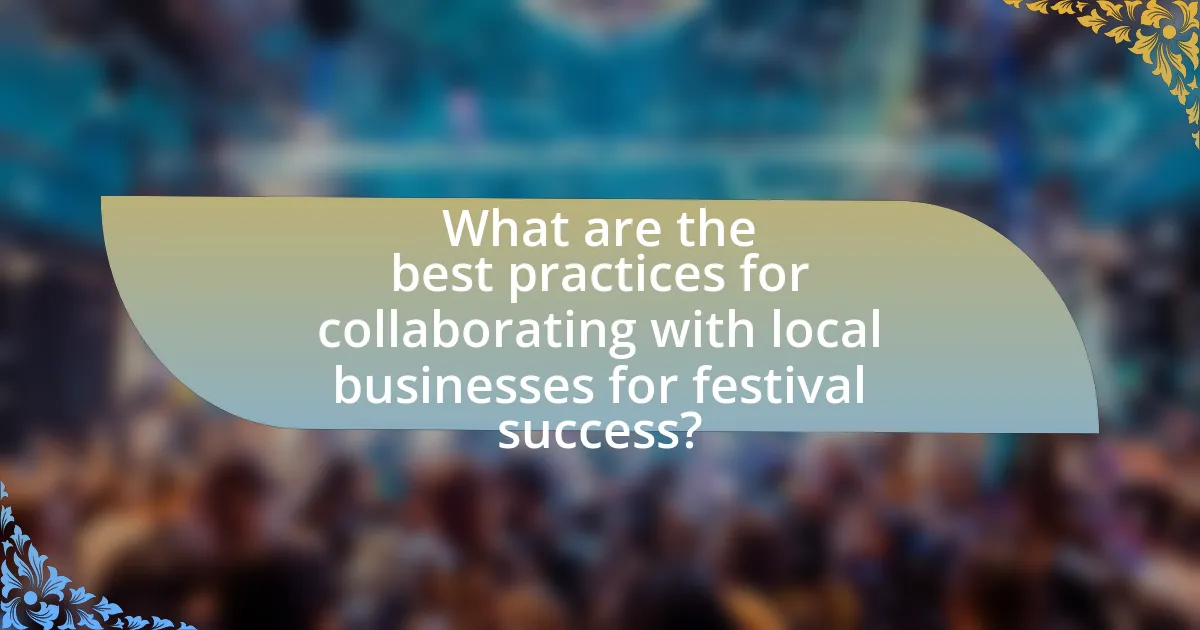
What are the best practices for collaborating with local businesses for festival success?
The best practices for collaborating with local businesses for festival success include establishing clear communication, creating mutually beneficial partnerships, and engaging in joint marketing efforts. Clear communication ensures that all parties understand their roles and expectations, which is crucial for smooth collaboration. Creating mutually beneficial partnerships allows local businesses to gain exposure while providing valuable resources or services to the festival, enhancing the overall experience. Engaging in joint marketing efforts, such as co-promotions or shared advertising, can increase visibility and attract more attendees, as evidenced by studies showing that collaborative marketing can boost event attendance by up to 30%.
How can festivals ensure mutual benefits for all parties involved?
Festivals can ensure mutual benefits for all parties involved by actively engaging local businesses in the planning and execution processes. This collaboration allows festivals to leverage local resources, enhance the visitor experience, and stimulate the local economy. For instance, studies show that festivals can increase local business revenues by up to 30% during event periods, as local vendors gain exposure to a larger audience. Additionally, partnerships with local businesses can lead to sponsorship opportunities, providing financial support for the festival while promoting the businesses involved. By creating a win-win scenario, festivals can foster community goodwill and ensure sustainable success for all stakeholders.
What are key elements of a successful partnership agreement?
Key elements of a successful partnership agreement include clear objectives, defined roles and responsibilities, effective communication protocols, and a dispute resolution mechanism. Clear objectives ensure that all parties understand the goals of the partnership, while defined roles and responsibilities delineate tasks and expectations for each partner. Effective communication protocols facilitate ongoing dialogue and collaboration, which is essential for addressing issues as they arise. A dispute resolution mechanism provides a structured approach to resolving conflicts, thereby maintaining the partnership’s integrity. These elements are critical for fostering a productive and sustainable collaboration, particularly in contexts such as local business partnerships for festival success, where alignment and cooperation are vital.
How can festivals measure the success of their collaborations?
Festivals can measure the success of their collaborations by analyzing key performance indicators (KPIs) such as attendance numbers, revenue generated, and participant satisfaction. For instance, a festival that partners with local businesses can track the increase in ticket sales and vendor revenue compared to previous years, indicating the effectiveness of the collaboration. Additionally, surveys conducted post-event can provide insights into attendee experiences and perceptions of the collaboration, with metrics like Net Promoter Score (NPS) serving as a quantifiable measure of satisfaction. These data points collectively validate the success of the partnerships formed with local businesses.
What tips can enhance collaboration with local businesses?
To enhance collaboration with local businesses, establish clear communication channels and mutual goals. Effective communication fosters trust and ensures that all parties understand their roles and expectations. For instance, regular meetings can help align objectives and address any concerns promptly. Additionally, creating joint marketing initiatives can leverage each business’s strengths, increasing visibility and attracting more attendees to the festival. Research shows that partnerships can lead to a 20% increase in event attendance when local businesses actively promote the event to their customer base.
How can festivals leverage social media to promote local partnerships?
Festivals can leverage social media to promote local partnerships by actively engaging with local businesses through targeted campaigns and collaborative content. By creating joint promotions, festivals can highlight local vendors, encouraging attendees to support them, which enhances community ties. For instance, festivals can feature local businesses in their social media posts, share behind-the-scenes content, and host giveaways that include products from these partners. This strategy not only increases visibility for local businesses but also fosters a sense of community, as evidenced by the success of events like the Austin City Limits Music Festival, which has significantly boosted local business revenue through strategic social media collaborations.
What role does community feedback play in refining collaboration strategies?
Community feedback is essential in refining collaboration strategies as it provides direct insights into the needs and preferences of local stakeholders. By actively soliciting and analyzing feedback from community members, organizations can identify gaps in their collaboration efforts and adjust their strategies accordingly. For instance, a study by the National Endowment for the Arts found that festivals that incorporated community input saw a 30% increase in local participation, demonstrating the tangible benefits of aligning collaboration strategies with community expectations. This feedback loop not only enhances the effectiveness of partnerships with local businesses but also fosters a sense of ownership and engagement among community members, ultimately leading to more successful festival outcomes.
